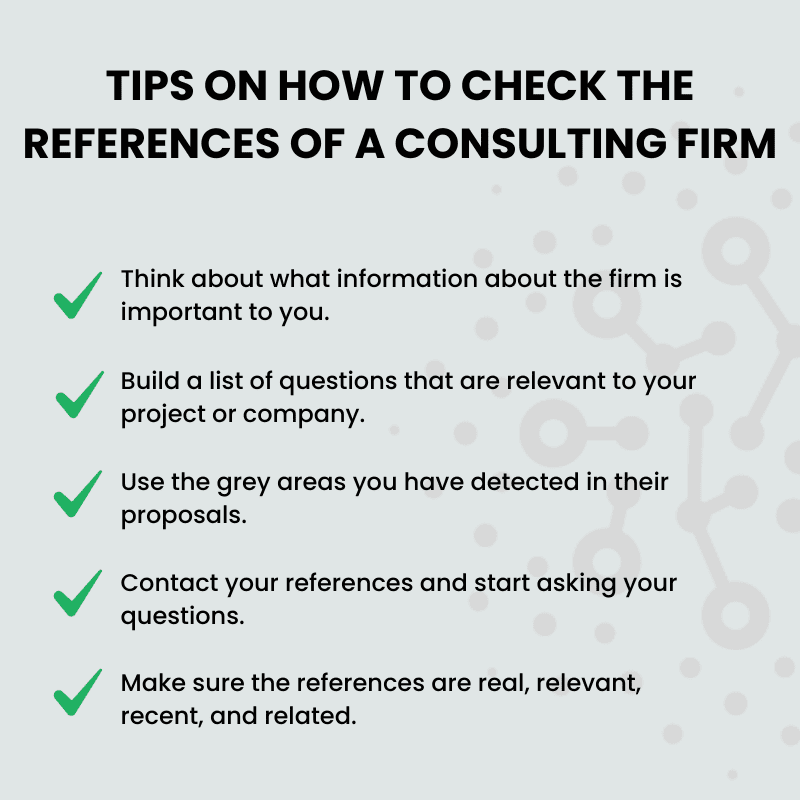If you’re on the hunt for a top-notch consultant or consulting firm to give your business that extra boost, let me tell you why it’s crucial to check the references for consulting services right from the start.
References can provide more information about the consultant or firm and can offer insights into the kind of work they have done in the past. Consulting services are an investment, and in many cases, you are generally paying a flat fee for the entirety of the project.
For instance, you read reviews on the internet for any product you use. Now you wouldn’t buy a product without going through any reviews. So then, why is it different for consulting? Consulting has long been a black-box, without transparency, but is it inevitable? Hell no!
Not checking the references can lead to wasted time and money, so it’s important that you build this step into your decision-making process. Hence, there are more reasons to check the references for consulting services; just read on to find out!
First Things First – Why Is It Important to Check References for Consulting Services?
Many businesses or companies do not check references for consulting and instead rely solely on the consultants’ or consulting firms’ words. And there is a very good chance that they will be let down by them.
When most people think of consultants, they think of someone who is hired to come in and offer their expertise on a particular subject. However, there is more to consulting than just having a set of skills or experience.
A good consultant is also someone who is able to adapt their approach to fit the needs of their client. For example, some consultants may be very technical and focused on the hard aspects of a problem, while others may be more concerned with people and the soft elements.
The best consultants are those who are able to assess a situation and tailor their approach accordingly. This ability to adapt is what sets the best consultants apart from the rest.
Consultants who are doers can be found even in categories such as operations excellence. In other words, they get you the productivity you require, albeit sometimes abruptly. They might offend some feelings because they focus first on results.
You might also find consultants that can be known as gatherers. They will get everyone on the same page about the project and make sure that both the management and operational teams are on board. But the results might be lesser or delayed, because they focus first on the relationships and the people.
So, depending on what your project is all about, you might need one kind of consultant over the other. It’s super important to get a handle on the ‘flavor’ of consultants you’re working with. But let’s be honest, you’re not likely to find that kind of info on their website.
Now, if you want to dig deep and find out if a consultant really nailed it in their past gigs, you have to go straight to the source. You’ve got to talk to their previous clients about how they performed. That’s why it is so important to check references for consulting services. It’s a must-do.
When to Check References for Consulting?
Do not wait until you are down to a single consulting firm before checking references because the feedback you receive from previous customers will help you in your evaluation of various proposals and influence your decision.
When you are in the final selection phase with three to five consulting firms, it is time to organize a few calls, ideally immediately after reviewing the final version of their offers.
How to Check References for Consulting the Right Way?

After making a shortlist of consulting firms and initiating the RFP process, it’s time to check the references. Ideally, checking references is perhaps the final step in selecting the right consultant or consulting firm for your business. Do not be misled by the presentation’s list of logos or the website’s and proposal’s anonymous case studies.
The projects that they represent might be very old or not very successful! You will never know if you don’t ask. So, you should require a minimum of two references for the project.
Go ahead and call those references, but make sure you’re asking the right questions. Start by jotting down what’s important to you. Maybe you’re interested in how well they can transfer knowledge, how they gel with teams, or what kind of impact they’ve had on the company.
Ask all your references and consulting firms the same set of questions. It’s a good idea to sprinkle in a few extra, tailored questions to clear up any confusion or uncertainties that popped up when you were going through the proposals.
What Questions to Ask?
To begin with, you want to properly assess whether or not the consulting firm in question is the right fit for your needs. So, keeping that in mind, you will need to find answers to some questions, such as the following.
- Do the consultants know what you’re going through and the problem you’re trying to solve?
- Do they have the right expertise and have enough experience to solve the problem?
- Do you think it will be possible for you and the consultant to work together?
Written proposals and slick pitches don’t always give you the whole picture. Checking references lets you dig deeper into a consulting firm’s track record. Some of your questions will be broad, focusing on what’s most important to you and relevant to any consulting firm.
But others should target specific firms, maybe probing a weakness or some confusing area in their proposal that caught your eye. So, when building your question list, keep these things in mind.
How to Build Your List of Questions?
For instance, is your priority about expertise? Let’s say you need someone with knowledge of gas distribution across Europe. This is quite specific. Maybe you can ensure that all the consulting companies have relevant experience.
Maybe you’ve been burnt by a consulting firm before, and you’re looking to dive a bit deeper this time. You want to take a good look at how they build relationships and manage their clients. Sure, you’ll be checking if they’ve got their project management down pat, can stick to deadlines, and if they leave a lasting good impression.
But, let’s face it, even with all this, they can still seem a bit like a mystery. That’s where you start using any unclear parts of their offer to your advantage.
So, what could these murky spots be? Well, as you dig into the proposal, you might stumble on some things that just don’t add up or spark doubts about whether the consultants can really pull off the task as per your requirements. This is why it’s super important to check references for consulting. From these sticky points, you can whip up a list of questions to help clear things up.
A Few Things to Keep in Mind About Consulting References
Once you’ve got your list of questions for your consultants lined up, you’re ready to dive into checking those references. But remember, as you navigate this step, there are some key points you should keep at the forefront of your mind.
#1. Make It Personal
The annual turnover rate in the consulting industry is between 15% and 20%. Partners and consultants transition from one consulting firm to the next, get engaged by clients, or establish their own consulting firm. Over the course of four to five years, entire teams are replaced by new talent.
For instance, in 2012, a top 10 consulting firm had an innovative organizational transformation practice that attracted smart individuals from around the globe. Five years later, all the consultants had departed, but the corporation retained its white papers and presentation references.
That being said, a crucial aspect of the success of a consulting project is the project’s leadership and the expertise of those engaged. Request references for the key members of the team. They must have played an active role in the referred projects.
#2. Make Sure the References Follow the 4 R’s Procedure
The 4 R’s procedure is simple and very easy to follow. The 4 R’s stand for Real, Relevant, Recent, and Related. Now, let’s look at them in a bit more detail.
a) Real: Right out of the gate, make sure you’re dealing with a legit reference. Don’t rush and just assume. We’ve seen instances where consultants name-drop their old colleagues (who are consultants, too) as references. So, double-check if the references are actual folks who’ve held relevant positions for your project. Cross-verify their names, titles, and backgrounds.
b) Relevant: Next, the reference needs to be about a project that’s similar to yours. This could be in terms of setting, objectives, location, or industry. You want to make sure the consulting firm has the know-how to get your project over the line.
c) Recent: Then, aim for fresh references. Set a cut-off for yourself – say, five years. Today’s industries and roles are evolving faster than ever. A project that ran smoothly a decade and a half ago doesn’t really give us a heads-up about what could go down in the present day.
d) Related: Lastly, the reference needs to be tied to the project manager or team who’ll be working on your project. In the consulting world, performance is often a matter of individual competence, especially that of the project manager. So, what you’re after is feedback on this particular project manager, not some unknown player who won’t be part of your project.
#3. Double-Check With the Previous Client
Digging into the references is a smart move when you’re bringing a new firm on board. This becomes particularly crucial if your project has its own unique quirks that demand a high degree of expertise.
By delving into the references, you can connect with the firm’s past clients to confirm if the firm has indeed had experience in your specific field. This little fact-checking exercise can offer valuable insights into the firm’s qualifications and their fit for your project.
#4. Always Only Ask for the Best
Last but not least, you want top references from companies where the consultants did a good job. It will also tell you how they did on the different factors that will be important to you as you make your choice.
For instance, if you’ve decided that cultural fit is an important factor for your project, ask the consultants how they worked with their teams and how they dealt with any differences in culture.
Don’t make any changes to the references. If the consulting company says they can’t give you references because of confidentiality, call a third party, like Consulting Quest, to check the references for you.
Watch this short video on how to check references for consulting!
A Quick Round-Up
So, while you’re busy setting sail towards success, remember this essential step to check the references for consulting services. It’s the compass that helps you navigate toward the right decision, ensuring you have the best possible support to conquer new territories and elevate your business to greater heights.
By following the important points mentioned in this post, you can be sure that you’re getting accurate and complete information from references that will help you make a decision about which consultant to hire.
check references for consulting check references for consulting check references for consulting check references for consulting check references for consulting check references for consulting check references for consulting check references for consulting check references for consulting
check references for consulting check references for consulting check references for consulting check references for consulting check references for consulting

How Consource Can Help?
With Consource, you get the assurance of authentic and verified consultants. It gives you access to honest feedback from customers, which helps you make decisions based on data that you can truly rely on!








0 Comments